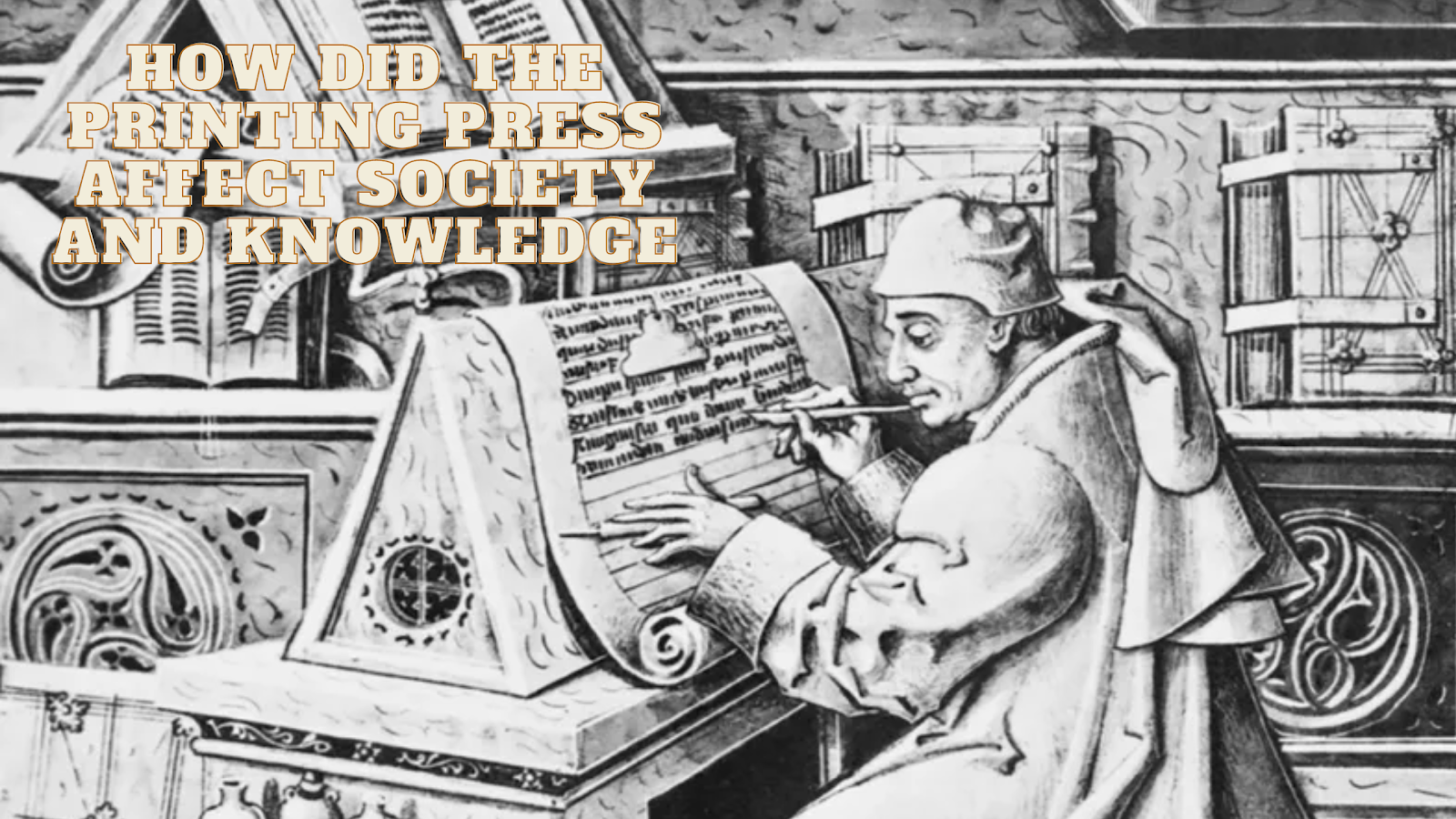How did the printing press affect society and knowledge
The
invention of the printing press by Johannes Gutenberg in the mid-15th century
revolutionized society and knowledge by enabling the mass production of books
and other printed materials. Prior to this innovation, books had to be
hand-written by scribes, which was a slow and expensive process that limited
the spread of knowledge to a small elite class. With the printing press, books
and pamphlets could be produced much more quickly and cheaply, making knowledge
more widely available.
One
of the most significant impacts of the printing press was the ability to spread
religious and political ideas more widely. For example, the Protestant
Reformation was made possible by the printing press, as Martin Luther's ideas
could be easily disseminated throughout Europe, leading to the fragmentation of
the Christian church and the emergence of individual denominations. The
printing press also enabled the spread of scientific knowledge, as scholars
could share their findings with a larger audience and build on the work of
others more quickly. This led to significant advancements in fields such as
astronomy, medicine, and mathematics.
The
printing press also had a profound economic impact, spurring the growth of
publishing and printing industries and enabling the rise of a literate middle
class.
Previously,
books and other printed materials were largely inaccessible to the wider
population, but with the printing press, books became more affordable and
widely available, leading to increased literacy rates and greater access to
education. This, in turn, had a profound impact on social and political
structures, as more people became literate and engaged with ideas and debates.
In
conclusion, the invention of the printing press had a revolutionary impact on
society and knowledge, making it possible to disseminate ideas and knowledge
more widely and affordably. This had far-reaching consequences, from the
fragmentation of the Christian church to the growth of publishing and printing
industries and the rise of a
ছাপাখানা কীভাবে সমাজ ও জ্ঞানকে
প্রভাবিত করেছিল
15 শতকের মাঝামাঝি সময়ে জোহানেস গুটেনবার্গ দ্বারা
মুদ্রণযন্ত্রের উদ্ভাবন বই এবং অন্যান্য মুদ্রিত সামগ্রীর ব্যাপক উত্পাদন সক্ষম
করে সমাজ ও জ্ঞানের বিপ্লব ঘটায়। এই উদ্ভাবনের আগে, বইগুলি লেখকদের হাতে লিখতে
হত, যা একটি ধীর এবং ব্যয়বহুল প্রক্রিয়া যা জ্ঞানের বিস্তারকে একটি ছোট অভিজাত
শ্রেণীর মধ্যে সীমিত করেছিল। ছাপাখানার সাহায্যে, বই এবং পুস্তিকাগুলি আরও দ্রুত
এবং সস্তায় তৈরি করা যেতে পারে, যা জ্ঞানকে আরও ব্যাপকভাবে উপলব্ধ করে।
প্রিন্টিং প্রেসের সবচেয়ে উল্লেখযোগ্য প্রভাবগুলির
মধ্যে একটি ছিল ধর্মীয় এবং রাজনৈতিক ধারণাগুলি আরও ব্যাপকভাবে ছড়িয়ে দেওয়ার
ক্ষমতা। উদাহরণ স্বরূপ, প্রটেস্ট্যান্ট সংস্কার সম্ভব হয়েছিল ছাপাখানার দ্বারা,
কারণ মার্টিন লুথারের ধারনা সহজেই সমগ্র ইউরোপে ছড়িয়ে দেওয়া যেতে পারে, যার ফলে
খ্রিস্টান গির্জা খণ্ডিত হয় এবং স্বতন্ত্র সম্প্রদায়ের উত্থান ঘটে।
মুদ্রণযন্ত্রটি বৈজ্ঞানিক জ্ঞানের বিস্তারকেও সক্ষম করে, কারণ পণ্ডিতরা তাদের
ফলাফলগুলি আরও বৃহত্তর শ্রোতার সাথে ভাগ করে নিতে পারে এবং অন্যদের কাজকে আরও
দ্রুত গড়ে তুলতে পারে। এটি জ্যোতির্বিদ্যা, চিকিৎসা এবং গণিতের মতো ক্ষেত্রে
উল্লেখযোগ্য অগ্রগতির দিকে পরিচালিত করে।
ছাপাখানার একটি গভীর অর্থনৈতিক প্রভাবও ছিল, যা
প্রকাশনা ও মুদ্রণ শিল্পের বৃদ্ধিকে উৎসাহিত করে এবং একটি শিক্ষিত মধ্যবিত্ত
শ্রেণীর উত্থানকে সক্ষম করে।
পূর্বে, বই এবং অন্যান্য মুদ্রিত সামগ্রীগুলি
ব্যাপকভাবে জনসংখ্যার কাছে অপ্রাপ্য ছিল, কিন্তু মুদ্রণযন্ত্রের সাথে, বইগুলি আরও
সাশ্রয়ী এবং ব্যাপকভাবে উপলব্ধ হয়ে ওঠে, যার ফলে সাক্ষরতার হার বৃদ্ধি পায় এবং
শিক্ষার বৃহত্তর প্রবেশাধিকার হয়। এর ফলে, সামাজিক ও রাজনৈতিক কাঠামোর উপর গভীর
প্রভাব পড়ে, কারণ আরও বেশি মানুষ শিক্ষিত হয়ে ওঠে এবং ধারণা ও বিতর্কের সাথে
জড়িত হয়।
উপসংহারে, প্রিন্টিং প্রেসের উদ্ভাবন সমাজ ও জ্ঞানের
উপর বৈপ্লবিক প্রভাব ফেলেছিল, যার ফলে ধারণা এবং জ্ঞানকে আরও ব্যাপকভাবে এবং
সাশ্রয়ীভাবে ছড়িয়ে দেওয়া সম্ভব হয়েছিল। খ্রিস্টান গির্জার খণ্ডিতকরণ থেকে
প্রকাশনা ও মুদ্রণ শিল্পের বৃদ্ধি এবং একটি শিল্পের উত্থান পর্যন্ত এর
সুদূরপ্রসারী ফলাফল ছিল।






No comments:
Post a Comment